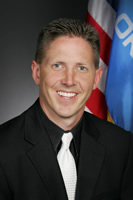In order to provide equal access and equal opportunity to people with diverse abilities, this site has been designed with accessibility in mind. Click here to view
Senate approves Medicaid reform bill
 Sen. Josh Brecheen
Sen. Josh Brecheen
Oklahoma leads 25 other states in the percentage of citizen’s personal income spent on welfare but is only higher than eight other states in the percentage spent on education funding. Sen. Josh Brecheen wants the state to shift its funding priorities.
The Senate approved his Senate Bill 1030 Monday afternoon to reform the state’s Medicaid program by lowering the working-age/able-bodied parent/caretaker Medicaid recipient income threshold to 20 percent of the Federal Poverty Level (FPL). Currently, eleven other states have their threshold at 24 percent or lower while seven, including Texas and Arkansas, have theirs set below 20 percent.
“More of working Oklahomans’ money is spent on welfare than education. We need to change this and using other state models to make such reallocations is a great start,” said Brecheen, R-Coalgate. “Lowering the threshold for those who are able to work will result in $84 million in annual savings, which could be used to fund a $1,400 teacher pay raise, and do so without raising taxes on working families.”
There are approximately 106,000 Oklahomans who are a part of the parent/caretaker group receiving Medicaid coverage who are able-bodied/working aged adults 19 to 64 and are not pregnant, nursing, disabled or blind. Thirty-two percent of those recipients are male and 25 percent are two adults living in the same home and both receiving Medicaid coverage.
Eligibility for parent/caretaker Medicaid coverage is dependent upon having children, not income alone. However, fifteen percent of the parent/caretaker group is made up of 19 year olds who have no dependents.
SB 1030 now moves to the House for further consideration.
 Oklahoma Senate
Oklahoma Senate

